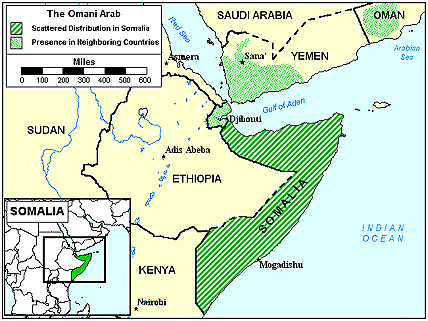|
|
Prayer Profile
The Omani Arab of Somalia
![[IMAGE]](../images2/0411.jpg) The Omani Arab represent less than one percent of Somalia's population of nearly seven million. It is believed that they immigrated to Somalia from Oman during the nineteenth century. The Omani are set apart from other Somalians by their unique use of the Arabic language and by their culture.
The Omani Arab represent less than one percent of Somalia's population of nearly seven million. It is believed that they immigrated to Somalia from Oman during the nineteenth century. The Omani are set apart from other Somalians by their unique use of the Arabic language and by their culture.
Although most Somalians are Sunni Muslims, virtually all of the Omani Arab belong to a tiny Islamic sect called Ibadaya (an off-shoot of Kharijism). The Ibadis withdrew from mainstream Islam in the seventh century and relocated in Oman and several other countries, including Somalia. They are more literal in their interpretation and application of the Koran than most Muslims.
Somalia is the easternmost country in Africa, forming the outer edge of the African Horn. In the early 1990's, this small nation attracted world attention after drought and civil war led to widespread starvation there.
What are their lives like?
The Omani Arab in the south and northwest regions of Somalia usually live in rural farm villages. They grow bananas, citrus fruit, sugar cane, corn, cotton, and sorghum. A typical village consists of a cluster of homes made of stones or sun-dried mud. Some live in towns where they are employed as shopkeepers. The Omani often gather in the marketplaces to buy and sell goods and also to socialize. They love to tell stories, recite poems or verses from the Koran, and visit with their friends.
Many of the Omani are nomadic- or semi-nomadic herdsmen. They travel from place to place with their herds of camels, cattle, goats, and sheep. They live in small, collapsible huts made of arched wooden braces covered with skins and grass mats.
The Omani Arab live in extended family units. Their society is patriarchal, or male-dominated. The men do not abuse this authority because they believe that their families should obey them out of respect, rather than fear. Also, there are clearly defined roles for both sexes. Even the children are given gender-specific duties. The men work outside in the fields while women work in the homes. Men and women often eat separately and never pray together. While men worship at mosques, women attend ceremonies conducted at home by female religious leaders. Marriages are generally pre-arranged by the parents. Children are a considered the family's greatest asset because they provide the parents with additional laborers and social security.
The Omani eat mainly dairy products, camel and goat meat, rice and other grains, and a variety of fruits and vegetables. Tea and coffee are their favorite beverages. Islamic law forbids them to eat pork or to drink alcohol. Most of the Omani wear traditional Arab clothes. Men wear white robes, turbans, and knives in brightly colored sashes. The women wear long, black dresses over colorful inner clothes. Some of them also wear black masks to cover their faces.
During 1992, Somalia was in a state of anarchy. The country's economy collapsed completely and the educational system was also severely affected.
What are their beliefs?
Islam is the state religion in Somalia, and most Somalians are Sunni Muslims who practice a moderate form of Islam. However, the Omani belong to the Ibadaya (Kharijite) sect. All Muslims, including the Ibadaya, recite prayers five times a day while facing Mecca. They also observe the prescribed fasts, give alms to the poor, and try to make at least one pilgrimage to Mecca.
The Omani standard is to accept others on their terms. For example, they view anything less than excessive generosity as rudeness. Even Christians are tolerated as long as they are not Muslim converts.
What are their needs?
There are only 27 known Omani Arab Christians in Somalia. Presently, there are no missions agencies working among them. Prayer is the key to penetrating these precious people with the Gospel of Jesus Christ.
Prayer Points
- Pray that the Lord will send forth many laborers into the harvest fields of Somalia.
- Ask God to give the 27 known Omani believers living in Somalia opportunities to share the Gospel with their own people.
- Pray that the Holy Spirit will anoint the Gospel as it goes forth via radio among the Omani Arab.
- Ask God to soften the hearts of the Omani Arab to the Gospel as it is presented to them.
- Pray that the Lord will reveal Himself to these precious people through dreams and visions.
- Take authority over the spiritual principalities and powers that are keeping the Omani Arab bound.
- Ask God to raise up prayer teams who will begin breaking up the soil through intercession.
- Pray that strong local churches will be raised up among the Omani Arab in Somalia.

Statistics
Latest estimates from the World Evangelization Research Center.
THE PEOPLE
- People name: Omani Arab
- Country: Somalia
- Their language: Arabiya
- Population:
- Largest religion:
- Christians: <1%
- Church members: 27
- Scriptures in their own language: Bible
- Jesus Film in their own language: Available
- Christian broadcasts in their own language: Available
- Mission agencies working among this people: None
- Persons who have heard the Gospel: 7,000 (26%)
- Persons who have never heard the Gospel: 19,900 (74%)
THEIR COUNTRY
- Country: Somalia
- Population:
- Major peoples in size order:
- Major religions:
- Number of denominations: 8
© Copyright 1997
Bethany World Prayer Center
This profile may be copied and distributed without obtaining permission
as long as it is not altered, bound, published
or used for profit purposes.
![[HOME BUTTON]](../graphics/home.jpg)
![[CALENDAR BUTTON]](../graphics/calico.jpg)
![[LIST BUTTON]](../graphics/listico.jpg)
[Home]
[Calendar]
[Country List]
|